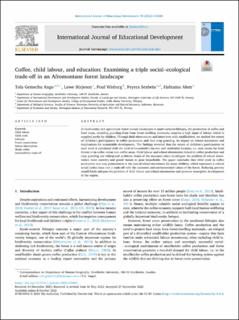| dc.contributor.author | Ango, Tola Gemechu | |
| dc.contributor.author | Börjeson, Lowe | |
| dc.contributor.author | Wisborg, Poul | |
| dc.contributor.author | Senbeta, Feyera | |
| dc.contributor.author | Alem, Habtamu | |
| dc.date.accessioned | 2022-11-03T09:23:58Z | |
| dc.date.available | 2022-11-03T09:23:58Z | |
| dc.date.created | 2022-10-09T16:27:36Z | |
| dc.date.issued | 2022 | |
| dc.identifier.citation | International Journal of Educational Development. 2022, 95 . | |
| dc.identifier.issn | 0738-0593 | |
| dc.identifier.uri | https://hdl.handle.net/11250/3029765 | |
| dc.description.abstract | In biodiversity rich agriculture–forest moasic landscapes in south-western Ethiopia, the production of coffee and food crops, including guarding them from forest-dwelling mammals, requires a high input of labour, which is supplied partly by children. Through field observations and interviews with smallholders, we studied the extent of children’s participation in coffee production and food crop guarding, its impact on school attendance and implications for sustainable development. The findings revealed that the extent of children’s participation in such work is correlated with the level of household’s income and residential location, i.e. near versus far from forests or in coffee versus non-coffee areas. Child labour and school absenteeism linked to coffee production and crop guarding are widespread problems. Some of the measures taken to mitigate the problem of school absenteeism were coercive and posed threats to poor households. The paper concludes that child work in coffee production and crop protection is at the cost of school attendance for many children, which represents a critical social justice issue and a trade-off with the economic and environmental values of the forest. Reducing poverty would likely mitigate the problem of child labour and school absenteeism and promote synergistic development in the region. | |
| dc.language.iso | eng | |
| dc.title | Coffee, child labour, and education: Examining a triple social–ecological trade-off in an Afromontane forest landscape | |
| dc.title.alternative | Coffee, child labour, and education: Examining a triple social–ecological trade-off in an Afromontane forest landscape | |
| dc.type | Peer reviewed | |
| dc.type | Journal article | |
| dc.description.version | publishedVersion | |
| dc.source.pagenumber | 14 | |
| dc.source.volume | 95 | |
| dc.source.journal | International Journal of Educational Development | |
| dc.identifier.doi | 10.1016/j.ijedudev.2022.102681 | |
| dc.identifier.cristin | 2059818 | |
| cristin.ispublished | true | |
| cristin.fulltext | original | |
| cristin.qualitycode | 2 | |
